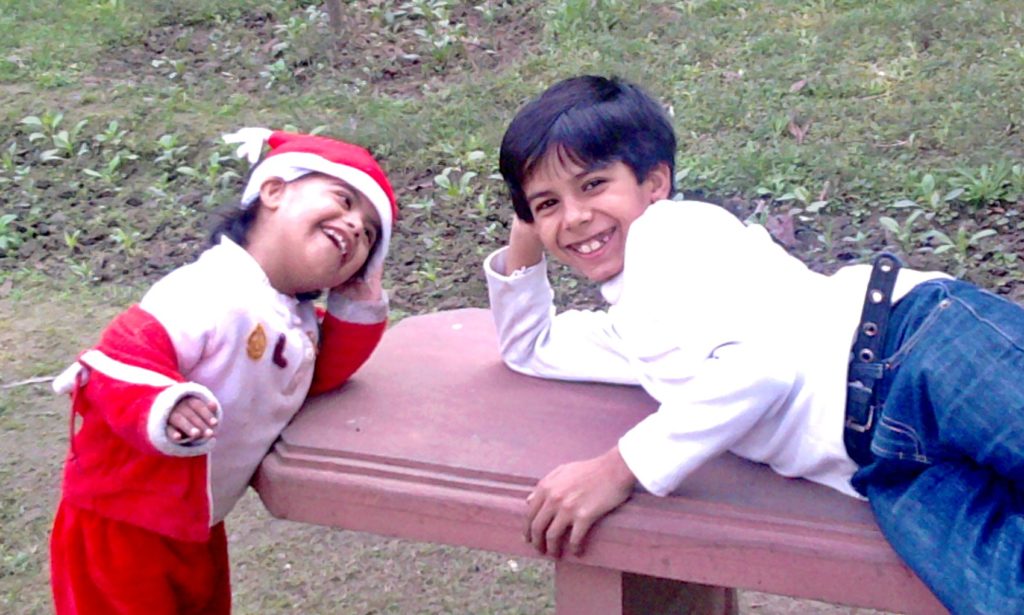
When I decided to put my daughter with Down syndrome in the same school as my son , I received a lot of suggestions and advice from other well-meaning parents. While only a few of them welcomed my decision, many warned me for the trauma that I would be putting my son through!
A fellow parent and the mother of a special needs child told me that by putting my daughter in the same school as my son, I was going to restrict his natural being. Another one feared that it might bring embarrassment to him when he grows up a little and also that he may soon end up resenting her. I was a little skeptical but then I decided to speak openly to my husband and son about it. My son thankfully was about ten when I took this decision and was more than happy to accompany or escort his little sister to the school. Yes, I had my own selfish interests to fulfil by sending them both in to the same school and in the same van. Having heard the horror stories of abuse by school van drivers, I absolutely wanted my daughter to be accompanied by my son and I didn’t see why that was also not his responsibility either. He has a destiny and a future that is different from his peers and that is a fact, neither he nor or I can change, and the sooner this gets accepted, the better it is for all of us.

I am all for considering the needs of the typical child here; but just to give the sibling a so- called ‘normal’ upbringing by making sure that his special little brother or sister stays away, is simply wrong! One cannot take away the fact that this typical child is a part of the family for better or for worse (mostly better), and by implying in words or deeds that his ‘normal’ schooling may be disrupted and that he may feel embarrassed, we are doing more harm to the entire sibling equation from the beginning.
Dealing with an intellectually or physically challenged child can change the dynamics of a family forever and one cannot modify or alter this event by saving the typical child from the troubles of a special needs sibling. Research has shown us that, the feelings of a child towards his sibling with a special needs is not always constant, but rather tends to change over time as he grows up and learns to adapt. It is parents’ responsibility to make sure that the feelings include pride, respect, and the right of the special needs sibling to belong.
To quote Dr. Scott L. Barkin, a clinical psychologist and executive director of Block Institute, which provides educational services to children with special needs “Relationships between siblings, with or without the presence of a disability, develop in encouraging, nurturing environments.”

And I truly believe that a parent can set the tone for sibling interactions and attitudes by examples and by open communications. While some of it can be influenced by factors such as the family’s child rearing practices, resources available, and the severity of the disability, setting a precedence for acceptance and knowledge of how to deal with the disability can help a sibling do the same both now and in the future.
If as a parent you would not think twice about sending both your typical kids to the same school, then there is no reason why you should not do that with your child with special needs. The reasons for doing that are same as they are for typical siblings.
- It builds responsibility: responsibility stems from dependability and it doesn’t only apply to the typical child. My daughter cares equally or more for my son who is 6 years older than she is. My son too would sometime go to her class at recess, checking to see if she has eaten. He would also save a seat for her in the van, and vice versa.
- The Social Network: All the friends of my son know Aarshia and are sensitized without us doing anything extra. They also feel that they have a responsibility towards her. They don’t ignore her, they are happy to say say ‘Hi’ whenever they see her in corridors. The fact that she goes to the same school as her brother has helped her develop a social network which otherwise wouldn’t have been possible.
- Safety: I mentioned it earlier and I am stating it again: the fact that my son accompanies my daughter in the school van helps me sleep better at night. The horror stories about the incidents in the van were one of the primary reason I wanted them both in the same school. My daughter has limited speech and my son being with her keeps me sane about her safety.

- Preparing for the future: Whether we accept it or not, brothers and sisters will be in the lives of family members with special needs longer than anyone else. Brothers and sisters will be there after parents are gone. Being with each other in various situations where the parents are not always available helps siblings form a much deeper bond than they would do in typical situations at home. School can be such a place.
- Ability to advocate or sensitise others: In one of the parent- teacher meetings, my son’s teacher told me that he very calmly shared about his sister’s diagnosis when the class was asked to share and speak about their siblings. His teacher was most impressed because he shared the facts without evoking any sympathy and was in no way embarrassed or shy. He also answered a few questions that his friends asked. That day remains my favourite till now.
The world is not an ideal place, and there may be times when your typical child may feel overburdened or anxious; but acknowledgement, open communication, and a sense of humour can come handy in these situations. My best advice is this:
- Be open
- Limit the care giving responsibilities of siblings
- Let the child with special needs also contribute in the household chores in any small way that he can
- Let the siblings settle their own differences
- Encourage them to express their feelings to you, even if negative
- Above all, know that your own interpretation of disability will be a greater influence on the adaptation of your typically developing sibling than the actual disability itself.
In any family, each sibling and relationship is unique, important and special. Brothers and sisters influence each other and play important roles in each other’s lives. Indeed, sibling relationships make up a child’s first social network and are the basis for his or her interactions with people outside the family (Powell & Ogle, 1985)
As parents it is our responsibility to make sure that these relationships are long lasting and as rewarding for the siblings as they are for us.
photo credit: www.examiner.com







Very well written and thankyou so much!